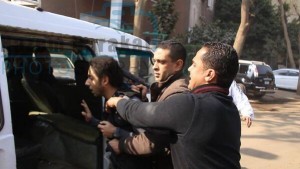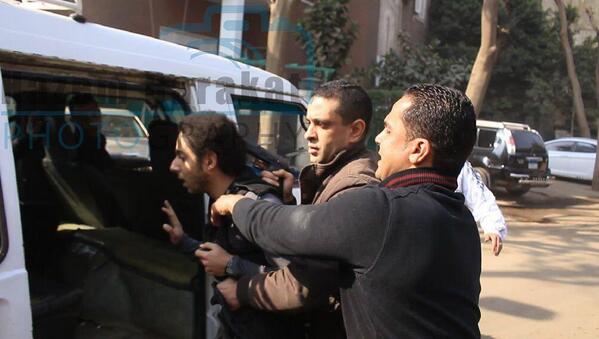 The undersigned organizations call for an immediate, independent investigation into growing claims of the brutal torture and sexual assault of detainees held in prisons and police stations in Egypt after their arrest in demonstrations on January 25th, the third anniversary of the Egyptian revolution.
The undersigned organizations call for an immediate, independent investigation into growing claims of the brutal torture and sexual assault of detainees held in prisons and police stations in Egypt after their arrest in demonstrations on January 25th, the third anniversary of the Egyptian revolution.
We ask that the estimated 1,000 detainees undergo an immediate medical exams and that a delegation of the undersigned organizations be permitted to conduct an independent, unconditional visit to detention facilities and meet with detainees.
Many detainees have testified to torture and sexual assaults by police that go beyond the routine abuse meted out in cases of mass arrests following demonstrations. These testimonies also exceed complaints from detainees arrested in the last six months, during which hundreds have been arbitrarily arrested, particularly in the months of August, September and October.
In his testimony, political activist Khaled al-Sayyed related the torture he witnessed at the Azbakiya and Qasr al-Nil police stations, as well as the torture he himself endured at the Abu Zaabal Prison. Rights lawyer Mahmoud Bilal, who attended al-Sayyed’s interrogation, confirmed his statement. Al-Sayyed attempted to prove that he had been tortured when he was brought before the Azbakiya Prosecution, removing his clothes to expose the injuries he had sustained as a result of the torture, but the prosecution initially refused to even refer to the torture in the report, with the investigating judge arguing that his job was limitied to considering whether to remand the suspect in custody or not. After lawyers insisted, the judge agreed to note in the report that lawyers asked for an investigation into complaints of torture of their clients, but he did not document the detailed testimonies or the obvious injuries on the bodies of detainees. Attorneys for the detainees fear that the report will go nowhere or that the prosecution will not thoroughly investigate the complaints. In addition, the investigating judge did not take the minimum steps necessary to protect the safety of the defendants by transferring them to another detention facility, even though they mentioned the names of the officers who tortured them at the Azbakiya police station and Abu Zaabal Prison. Attorney Mahmoud Bilal said that one officer threatened to get even with the detainees in the presence of the judge supervising the renewal of remand, because they said they had been tortured by police.
After the prosecution refused to document the injury and torture of detainees, lawyers filed a complaint with the National Council for Human Rights, documenting information they had managed to obtain from detainees who related what happened to them.
The undersigned organizations fear that there are many similar cases in which victims have refused to testify in fear of the response from police or prison officers.
Al-Sayyed spoke in detail about the torture endured by many detainees who were arbitrarily arrested and taken to the Azbakiya police station. He said that a security force at the station put the known political activists in the room where the torture took place and blindfolded them, forcing them to listen to the screams of detainees who were being beaten and electrocuted. The activists were repeatedly told things like, “You revolutionaries are to blame for what’s happening to these kids. If not for you, we would’ve let them go already, they’d already be home.” More than one person who was returned to the detention room after torture claimed they had been sexually assaulted and electrocuted on various parts of their bodies.
The undersigned organizations express their concern as well regarding documented testimonies claiming virginity tests have been carried out on female detainees in Qanater prison against their well, as well as testimonies of police officers sexually assaulting detainees at various police stations.
In the past seven months, thousands of people have been arrested and detained and been victims of police brutality with demonstrators. As a result, temporary detention facilities, prisons and Central Security Forces camps (which are not legal detention facilities) are overcrowded and conditions have severely worsened. At present they do not meet the minimum threshold of guarantees enumerated in the new constitution, Article 54 of which states, “Any person who is arrested, imprisoned or whose freedom is restricted must be treated in a way that preserves his dignity. He may not be tortured, intimidated, coerced or harmed physically or psychologically. He may only be detained or imprisoned in specially designated sites with appropriate humanitarian and health conditions. The state must provide means of access for disabled persons. A violation of any of these provisions is a crime punishable by law. The defendant has the right to remain silent. Any statement proven to have been made by the detainee under any of the foregoing conditions or threat thereof is invalid and inadmissible.” Detention conditions are also incompatible with the International Convention Against Torture, ratified by Egypt. Article 93 of the constitution states that such conventions acquire the force of law immediately upon ratification and publication in the Official Gazette.
Some forms of torture reported to the undersigned organizations are similar to those used against people detained the same period last year after the protests marking the second anniversary of the revolution, during the early days of the tenure of the current interior minister, Mohamed Ibrahim. At that time, security forces arrested hundreds of people and tortured them in CSF camps, prisons and police stations. Several testimonies confirmed sexual assaults and rape, and there was one death in a detention facility, that of activist Mohamed al-Gindi.
Interior Minister Ibrahim issued a statement on Tuesday, 11 February, denying allegations of torture by police. He claimed that several human rights organizations made visits to various prisons and met with inmates, and he welcomed any request from advocacy groups to visit prisons.
The undersigned organizations emphasize that Egyptian prisons are subject to no genuine oversight and independent organizations or lawyers are not permitted to visit them; nor do independent judicial bodies undertake regular inspections of prison conditions, although the law and the Constitution give them this right. Under Article 55 of the 2014 Constitution, Articles 85 and 86 of the prisons law and Article 27 of the judiciary law, prosecutors and heads and deputy heads of first-instance and appellate courts have the right to inspect prisons in their jurisdiction. In addition, under general directives for prosecution offices, at least once a month a routine inspection should be conducted and a report written on any violations documented. Nevertheless, no investigation or disciplinary measures against any Prisons Authority official has been announced recently, despite successive reports of violations.
Independent Egyptian human rights organizations have not been allowed to visit detention facilities for any reason. In fact, the Interior Ministry responds to all visit requests by noting that no provision in Egypt law permits a non-judicial body to visit prisons and detention facilities.
Several advocacy groups asked to visit the Port Said Prison on 30 January 2013 to assess the health condition of certain prisoners, following appeals from their families. The human rights and public outreach department of the Interior Ministry denied the request,[1] saying that there is no provision in the prison law that gives civil society groups the right to visit detention facilities.
The undersigned organizations are also concerned that the prosecution added the charge of killing demonstrators to the regular laundry list of charges brought against detainees, such as demonstrating without a permit, assembly, blocking roads and attacking security personnel. It is odd that the prosecution would charge detained demonstrators with killing their colleagues, who were shot on Saturday, 25 January, in marches that set out from the High Court and Talaat Harb Square.
Signatory organizations:
1. The Egyptian Initiative for Personal Rights
2. Cairo Institute for Human Rights Studies
3. Appropriate Communications Techniques for Development (ACT)
4. Egyptian Coalition for the Rights of the Child
5. Egyptian Women’s Legal Foundation
6. Masryoon Against Religious Discrimination
7. Association for Freedom of Thought and Expression
8. Hisham Mubarak Center for Law
9. Land Center for Human Rights
10. Nadim Center for Rehabilitation of Victims of Violence and Torture
11. Nazra for Feminist Studies
12. The Arab Network for Human Rights Information
13.The Egyptian Association for Community Participation Enhancement
14. The Egyptian Center for Economic and Social Rights
15. National Community of Human Rights and Law
16. Andalus institute for tolerance and anti-violence studies
Share this Post

